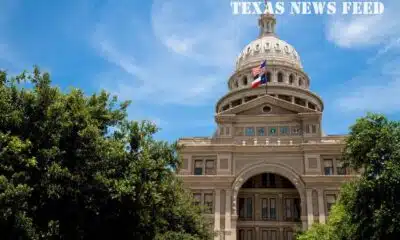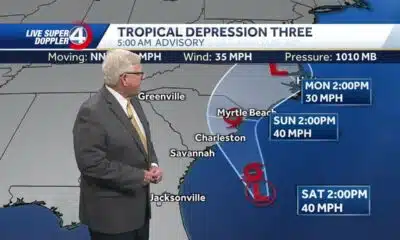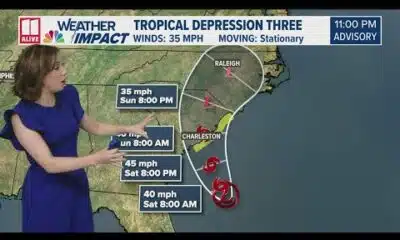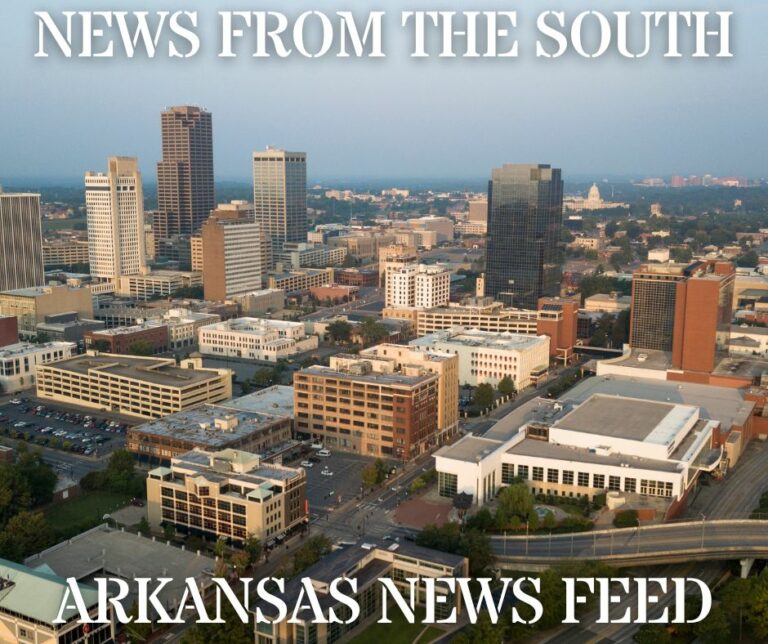News from the South - North Carolina News Feed
Losing state Supreme Court candidate Jefferson Griffin’s legal case to overturn 2024 election results hits obstacle • Asheville Watchdog
Republican candidate Jefferson Griffin’s attempt to reverse his razor-thin loss for a state Supreme Court seat by disqualifying the ballots of more than 66,000 voters suffered a blow when a Wake County judge tossed his lawsuit Friday.
In a one-page decision issued after hearing arguments from lawyers on both sides of the dispute, Superior Court Judge William Pittman wrote he found no reason to overturn the state Board of Elections decision in December to declare incumbent Allison Riggs the winner by 734 votes out of more than 5.5 million cast.
That ruling followed three recounts demanded by Griffin, himself an appellate judge. Griffin, backed by a state and national Republican Party team, had launched a campaign to disqualify ballots that he claimed shouldn’t have been counted because the voters didn’t fully comply with North Carolina voter-registration law. The great majority of the alleged violations were missing voter ID records, which the Board of Elections and other courts had determined weren’t required.
Griffin’s team showed no evidence of voter fraud, nor did the targeted voters know their ballots had been questioned.
“The Board’s decision was not in violation of constitutional provisions, was not in excess of statutory authority or jurisdiction of the agency, was made upon lawful procedure, and was not affected by other error of law,” Pittman wrote in one of three nearly identical orders rejecting the challenge.
Pittman’s order can be appealed, but opposition to his continued effort is building even within the Republican ranks because of the backlash it has generated.
Griffin’s challenge reached the state Supreme Court last month, where Republicans hold a 5-2 majority.
In a vaguely written 6-0 order with Riggs recusing herself, the high court tossed Griffin’s case back to where it started in Wake County. The justices ruled the case needs to follow the traditional path through the appellate process rather than jumping directly to the state Supreme Court.
Similarly, the Elections Board’s parallel attempt to move the case out of the reach of the state Supreme Court to federal court made it to the Fourth Circuit Court of Appeals in Richmond, before being redirected to the North Carolina courts for lack of federal jurisdiction.
Analysts have found that the groups of voters Griffin has targeted tended to lean toward Democratic Party candidates, which meant that Griffin would likely prevail if they were disqualified.
The largest of the groups included more than 60,000 ballots cast during early voting. The second group consisted of voters who live overseas or who serve in the military. The third included a small cohort of overseas residents who typically are family members of military personnel and who don’t live – and may never have lived – in North Carolina.
Recently, the investigative news site ProPublica discovered that Griffin himself had used a military absentee ballot to vote in two state elections when he was deployed as a member of the North Carolina National Guard.
In a brief filed to the state Supreme Court, Griffin asked that a recount should start by focusing on the overseas and military ballots cast in just four counties – Buncombe, Forsyth, Guilford and Durham. These are among the most-heavily Democratic-leaning electorates in the state. Buncombe voters voted more than 2-1 for Riggs.
Griffin said he was confident that by disqualifying this bloc of voters in these four counties, he would prevail in a recount.
But the tactic ignited fury among impacted voters, especially those who serve in the military and diplomatic posts.
Typical of these is Air Force Col. Bobby Buckner, a registered Republican who commands a squadron at a U.S. base and who voted an absentee ballot in Buncombe County.
“I would caution this candidate that eroding or challenging our rights to vote because someone does not like the outcome, goes against the very reason I chose to serve my country: freedom and the ability to have a voice,” Buckner previously told Asheville Watchdog.
Asheville Watchdog is a nonprofit news team producing stories that matter to Asheville and Buncombe County. Tom Fiedler is a Pulitzer Prize-winning political reporter and dean emeritus from Boston University who lives in Asheville. Email him at tfiedler@avlwatchdog.org. The Watchdog’s reporting is made possible by donations from the community. To show your support for this vital public service go to avlwatchdog.org/support-our-publication/.
Related
The post Losing state Supreme Court candidate Jefferson Griffin’s legal case to overturn 2024 election results hits obstacle • Asheville Watchdog appeared first on avlwatchdog.org
News from the South - North Carolina News Feed
Red flags when you're buying or selling a used car
SUMMARY: Buying or selling a used car this summer requires caution due to prevalent scams. July is peak season for used car transactions, attracting scammers targeting both buyers and sellers. John Matarice highlights how easy it is to fall for fake check scams, like Matt Nef, who tried selling a 1948 Packard and received a counterfeit check exceeding his asking price, with requests to send money to a shipping company. Similarly, buyer Dejon Wallace nearly lost $1,200 on a fake check from a seller on Facebook Marketplace. To avoid fraud, always meet in person, never cash checks and send money back, and avoid wiring funds to strangers.
July is typically peak season for buying and selling used cars. Anyone in the market for one or trying to sell their own should be wary of scams.
News from the South - North Carolina News Feed
What to expect traveling for July 4: roads, weather, air travel
SUMMARY: Many Americans are traveling extensively this July 4th, with airports and roads packed for the holiday weekend. However, severe weather is causing significant disruptions. In Texas, heavy rainfall triggered flash floods near Kerrville, leading to evacuations and multiple deaths. The Northeast also faces storms, resulting in over 100,000 power outages across New York, Pennsylvania, New Jersey, and Massachusetts. New Jersey reported at least three storm-related deaths. Despite weather challenges, air travel is expected to hit a record with nearly 6 million domestic passengers, while over 61 million are predicted to travel by car. Gas prices are at their lowest July 4th average since 2021.
While the airports and roads have been packed, severe weather has also been causing major problems. ABC’s Olivia Rubin has more.
More:
Download: https://abc11.com/apps/
Like us on Facebook: https://www.facebook.com/ABC11/
Instagram: https://www.instagram.com/abc11_wtvd/
Threads: https://www.threads.net/@abc11_wtvd
TIKTOK: https://www.tiktok.com/@abc11_eyewitnessnews
News from the South - North Carolina News Feed
A July 4th “must read”: The Declaration of Independence
SUMMARY: On July 4, 1776, thirteen American colonies declared independence from British rule, citing King George III’s repeated abuses and denial of rights. The Declaration of Independence asserts that all men are created equal, endowed with unalienable rights to life, liberty, and the pursuit of happiness. Governments derive legitimacy from the consent of the governed and must be altered or abolished if destructive to these rights. After numerous grievances—such as unlawful laws, taxation without consent, military oppression, and judicial manipulation—the colonies declared themselves free and independent states, pledging mutual support for their new nation’s liberty and security.
The post A July 4th “must read”: The Declaration of Independence appeared first on ncnewsline.com
-
The Center Square6 days ago
U.S. Senate prepares for passage of One Big Beautiful Bill Act | National
-
News from the South - Louisiana News Feed6 days ago
Water company hiked sewage rates in Lafayette to state’s highest
-
News from the South - Tennessee News Feed6 days ago
“Choose how you love:” Nashville Pride 2025
-
Mississippi Today5 days ago
Feds unfreeze $137 million in Mississippi education money
-
News from the South - Virginia News Feed7 days ago
Senate Republicans work through the weekend to pass Trump’s One Big Beautiful Bill
-
News from the South - Arkansas News Feed6 days ago
Thousands celebrate pride, progress at the 2025 NWA Pride Parade
-
News from the South - Arkansas News Feed6 days ago
Congress unlikely to enact ‘absolutely devastating’ Trump proposal to slash Pell Grants
-
Local News6 days ago
Mississippi airports working to complete projects








































